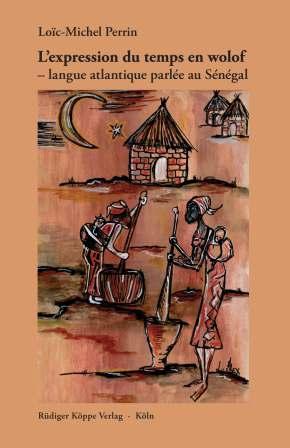
L’expression du temps en wolof
– langue atlantique parlée au Sénégal
Author: Loïc-Michel Perrin. Series edited by: Wilhelm J.G. Möhlig †, Bernd Heine.
Series: GA Grammatical Analyses of African Languages Volume 41
20124 pp. Roman, 331 pp.
numerous graphs, tables and charts
Text language(s): French
Format: 160 x 240 mm
660 g
Paperback
€ 69.80
Buy 'L’expression du temps en wolof' as a downloadable PDF document directly from our online shop »
Order 'L’expression du temps en wolof' as print edition »
Wolof is a Senegambian language of the Atlantic branch of the Niger-Congo phylum spoken by approximately 4 million people in Senegal, being the country’s most widely spoken language, while in Senegal Wolof is national and official language and further used as language of wider communication, it also spreads to (mostly the northern part of) Gambia with 185,000 and southern Mauretania with 12,000 speakers (2006).
This study deals with the expression of time in Wolof. Through a syntactic and semantic approach, it studies and gives an account of the various linguistic processes used to express various time relations in Wolof. The collected data is analysed on the basis of the syntactic constructions used to locate an event in the time. From a typological viewpoint, this study shows clearly that Wolof tends to use a predicative strategy (auxiliary verbs, fossilized verbal forms, ...) whereas other languages use adverbs.
The main chapters concern:
(i) The verbal system (tense and aspects) as well as the lexical elements and the verbal and nominal phrases which convey an aspectual value;
(ii) The adverbial phrases of time (lexemes, nominal and adverbial phrases and set expressions) and the temporal discourse markers;
(iii) The temporal and hypothetical subordinate clauses; (Appendices) The vocabulary relating to the wolof calendar.
The present edition was derived from the revised and updated PhD dissertation of the author Des représentations du temps en wolof, University Paris 7 – Denis Diderot, 2005.
Accompanying material:
- Les classes nominales dans les langues atlantiques
(ISBN 978-3-89645-565-9 ) - Vies quotidiennes à Dakar (Sénégal) / Everyday Life in Dakar (Senegal) / Nettaliy dundin ci Ndakaaru, bis bu nekk
(ISBN 978-3-89645-285-6 )
Cross-reference:
- Aktuelle Forschungen zu afrikanischen Sprachen
(ISBN 978-3-89645-401-0 ) - Codeswitching in Gambia
(ISBN 978-3-927620-24-7 ) - La qualification dans les langues africaines / Qualification in African Languages
(ISBN 978-3-89645-253-5 )
| « back | Print version | [top] |
 Books
Books Audio
Audio Biographies
Biographies Series
Series Festschrifts
Festschrifts Journals
Journals